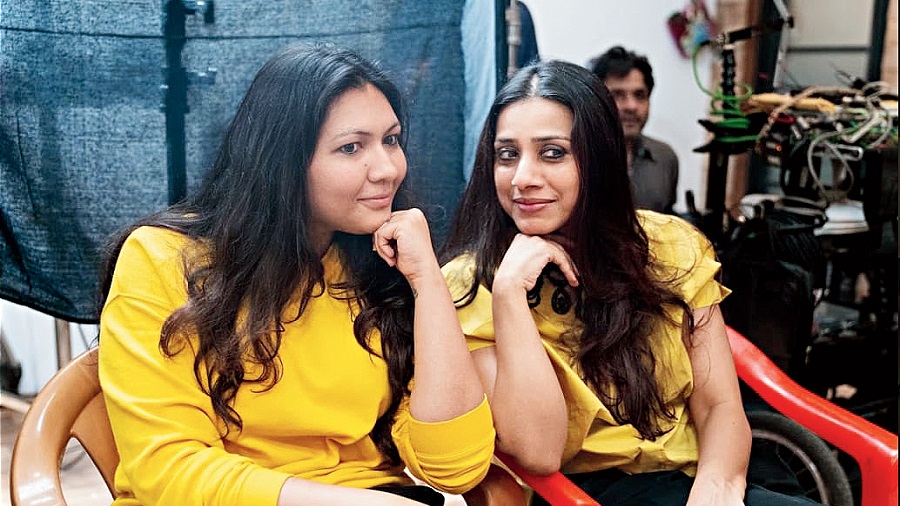Masaba Masaba, a six-episode series on Netflix that melds fact and fiction to tell the story of fashion designer Masaba Gupta, has opened to praise. The series that also stars Masaba’s mother Neena Gupta, has been created by Ashvini Yardi and directed by Sonam Nair. The Telegraph caught up with Ashvini and Sonam over a Zoom call to know more about their show.
What’s the idea behind Masaba Masaba?
Ashvini Yardi: This is a concept I have been thinking about for two years. A concept about someone playing herself. This is something we haven’t seen in our space before. What I needed for this was a person who is totally open, who isn’t afraid of showing things the way they are.
I used to follow Masaba on Instagram and her stories were funny and fitted my concept. I realised that her stories were actually my concept. In them, she speaks of her stretch marks, her pimples, puts up photographs of herself without make-up and talks of body positivity.... I spoke to her, and she was so open... she was like, ‘Ya, let’s do it’. I asked if Neenaji could be part of it and play her mother. And Neenaji was also open to it. Both of them are so cool.
I pitched it to Netflix who saw my vision. I was very sure that we needed a woman director. Because both Masaba and Neenaji are very open people and their lives have been so public, I wanted another woman to be sensitive enough to see that. We zeroed in on Sonam (Nair).
Why call it Masaba Masaba?
Ashvini: The show focuses on people who lead two lives, one for the public and one for themselves. So it’s basically one person who plays two different roles. Plus, I loved the way it sounds (laughs). Also, a couple of years ago, there was a show on Zee TV called Kareena Kareena, which I liked.
Sonam, how did you walk the tightrope between fact and fiction?
Sonam Nair: I treated it purely as an adaptation. The idea was to get a lot of raw material and then add your own voice, structure and spin to it. Neenaji and Masaba were my raw material — their characters, the incidents that happened to them, the way they think.... Most often, we struggle with writing subjects and characters, lekin yahan bani banayi full lives have been lived and they were made available to us. Me and my three other writers, along with Ashvini, Masaba and Neenaji, would just sit and chat and they gave us this raw material.
Then it was quite a struggle to decide the arc, what to put in and leave out in just six episodes, ‘Arre, this joke is so good, but it doesn’t fit into the narrative’, ‘Okay, this line should perhaps be in that episode’.... That juggling, those two-three months of writing were very stressful. It was a new format, there was no reference, there was no structure, no language. We kept thinking whether we were going in the right direction. But once we had the script ready, we did a reading together and decided, ‘Chalo, ab enjoy karte hain’.
This is a show that triumphantly feeds into stereotypes, but gives a spin to them and the tonality is over-the-top, complete with asides and a tongue-in-cheek look at celebrity life. Was that what you were aiming for?
Sonam: That was the main reason why I wanted to do this show... to make statements and a commentary about what we see around us. I have been a part of this industry for a long time... Masaba, Neenaji and that circle of people are my circle... we’ve heard of these stories and we know what happens behind the scenes. So to be able to comment on that in this tongue-in-cheek way was fun. We had these amazing women and we had their stories... but what beyond that? To take it to another level where it relates to everybody, we had to talk about other themes. And one of the main themes is the celebrity culture that we have, how everybody has a facade....
Did Masaba being such a natural in front of the camera surprise you?
Ashvini: In the beginning, I was a little worried... we had the story, we had the woman, but what about acting?! (Laughs) I would keep asking Masaba if she wanted to start her training, and she would be like, ‘No, chill’. She used to be so confident, and fortunately that confidence shows on screen. She’s so natural.
Sonam: I think because I have worked with kids and all sorts of non-actors — even in this, we see a lot of non-actors playing themselves — I wasn’t too worried, but the first time we did a reading, I was ecstatic. I was like, ‘Oh Masaba, you can act!’ (Laughs) Then it became about directing a proper actor instead of holding the hand of a novice.
How important is it for women to tell women’s stories?
Ashvini: I personally don’t feel that’s a must. There have been some great women’s stories made by men. Only for this did I feel that we needed a woman director because it’s not like your regular fiction story... there are a lot of boundaries that could be crossed, there was a lot of sensitive material to be handled....
Sonam: Honestly, I would love to tell some good men’s stories!
Ashvini, will this spin off a new genre?
Ashvini: I hope I get to keep the copyright of this! I can’t tell you what I went through trying to explain this concept to people. But there is huge potential to take this forward for sure.










